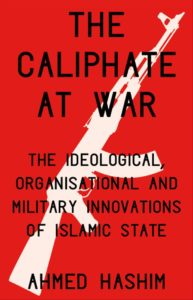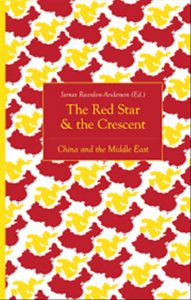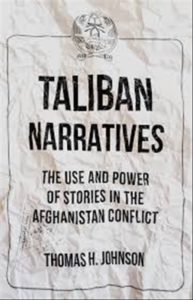
The Caliphate at War: The Ideological, Organisational and Military Innovations of Islamic State
Ahmed Hashim
Hurst Publishers
Rs4,580
ISIS’s astonishing and unexpected military victories in 2014 and 2015 redrew the geopolitical map of the Middle East. Media attention focused on the organisation’s savage treatment of its enemies and its ability to attract foreign fighters, but as this dispassionate book demonstrates it also made important innovations in strategy, ideology and governance. Ahmed S. Hashim argues that by focusing their ideology first and foremost on extreme anti-Shia sectarianism - rather than on Western ‘infidels’ - ISIS’ founders were able to present themselves as the saviours of what they saw as the embattled Sunni ‘nation’ in Iraq. This enabled them to win the support of Sunni communities. Moreover, ISIS’ stunning ability to take major cities was a result of its innovative tactics. It sowed terror in advance of its attacks by using targeted assassinations to kill key city leaders, and its decentralised regional command structure facilitated an unusual degree of coordination between small assault units. At the same time the organisation made a serious effort to engage in state-building and population control. By going beyond the often starkly unpleasant current affairs of the Islamic State, The Caliphate at War undertakes an essential investigation into the successes of the group, to better understand how the movement has survived, thrived, and reshaped the Middle East.
Ahmed S. Hashim is Associate Professor of Strategic Studies at Nanyang Technological University’s Rajaratnam School of International Studies, where he specialises in contemporary warfare issues, Middle Eastern security and counter-terrorism. He is the author of Insurgency and Counterinsurgency in Iraq and The Caliphate At War: The Ideological, Organisational and Military Innovations of Islamic State.

The Red Star and the Crescent: China and the Middle East
James Reardon-Anderson
C. Hurst & Company (Publishers) Limited (2018)
Rs4,580
The Red Star and the Crescent provides an in-depth and multi-disciplinary analysis of the evolving relationship between China and the Middle East. Despite its increasing importance, very few studies have examined this dynamic, deepening, and multi-faceted nexus. James Reardon-Anderson has sought to fill this critical gap.The volume examines the ‘big picture’ of international relations, then zooms in on case studies and probes the underlying domestic factors on each side. Reardon-Anderson tackles topics as diverse as China’s security strategy in the Middle East, its military relations with the states of the region, its role in the Iran nuclear negotiations, the Uyghur question, and the significance and consequences of the Silk Road strategy. A comprehensive study of the changing forces driving one of the world’s most important strategic, economic and cultural relationships.
James Reardon-Anderson is Sun Yat-sen Professor of Chinese Studies and Dean of the Georgetown University School of Foreign Studies in Qatar. He is the author of five books on the history and politics of China, most recently Reluctant Pioneers: China’s Expansion Northward, 1644-1937 (2005).

Taliban Narratives: The Use and Power of Stories in the Afghanistan Conflict
Thomas H. Johnson
Hurst Publishers (2017)
Rs5,496
Why has the Taliban been so much more effective in presenting messages that resonate with the Afghan population than the United States, the Afghan Government and their allies? This book, based on years of field research and the assessment of hundreds of original source materials, examines the information operations and related narratives of Afghan insurgents, especially the Afghan Taliban, and investigates how the Taliban has won the information war. Taliban messaging, wrapped in the narrative of jihad, is both to the point and in tune with the target audiences it wishes to influence. On the other hand, the United States and its Kabul allies committed a basic messaging blunder, failing to present narratives that spoke to or, often, were even understood by their target audiences. Thomas Johnson systematically explains why the United States lost this “battle of the story” in Afghanistan, and argues that this defeat may have lost the U.S. the entire war, despite its conventional and technological superiority.
Thomas H. Johnson is a Research Professor of National Security Affairs at the Naval Postgraduate School (Monterey, California). He has conducted research and published widely on Afghanistan and South Asia for three decades. In 2009, he served as the Senior Political and Counterinsurgency Advisor to Gen Jonathan Vance, Commander of Canadian Forces in Afghanistan (Task Force Kandahar).

Norman Anderson and the Christian Mission to Modernise Islam
Todd Thompson
Hurst Publishers (2017)
Rs10,077
Western Christians in the twentieth century viewed Islam through a lens of social and political concerns that would have appeared novel to their medieval and early-modern predecessors. Concerns about the predicament of secular ‘modernity’ infused Christian discourse with distinct assumptions that shaped engagement with Islam in fundamentally new ways. J. N. D. (Norman) Anderson (1908-94), a highly influential British Christian scholar of Islam, embodied this new orientation in his commitment to ‘modernise’ Islam. Anderson’s engagement with Islam as a missionary, intelligence agent, scholar of Islamic law and advisor to various Muslim governments, spanned multiple decades and continents. As well as shaping Western understandings of Islamic law and its application, he was involved in debates about the end of the British Empire and the transformation of Christian missions following formal decolonisation. Because of Anderson’s location at the intersection of so many different debates concerning Islam, his life provides unique insights into the ways in which Christians reconfigured their response to Islam in the last century. Given Christianity’s continued influence on British and American ideas about Islam, this study provides crucial insight into the persistent focus on ‘modernising’ and ‘secularising’ Islam today.
Todd Thompson is an assistant professor of History in the Torrey Honors Institute at Biola University. His research focuses on the intersections of British and Middle Eastern history in the twentieth century as well as the comparative histories of Western and Middle-Eastern Christian engagement with Islam.

Why Europe Intervenes in Africa: Security, Prestige and the Legacy of Colonialism
Catherine Gegout
Oxford University Press (2017)
Rs6,412
Why Europe Intervenes in Africa analyses the underlying causes of all European decisions for and against military interventions in conflicts in African states since the late 1980s. It focuses on the main European actors who have deployed troops in Africa: France, the United Kingdom and the European Union.
When conflict occurs in Africa, the response of European actors is generally inaction. This can be explained in several ways: the absence of strategic and economic interests, the unwillingness of European leaders to become involved in conflicts in former colonies of other European states, and sometimes the Eurocentric assumption that conflict in Africa is a normal event which does not require intervention. When European actors do decide to intervene, it is primarily for motives of security and prestige, and not primarily for economic or humanitarian reasons. The weight of past relations with Africa can also be a driver for European military intervention, but the impact of that past is changing.
This book offers a theory of European intervention based mainly on realist and post-colonial approaches. It refutes the assumptions of liberals and constructivists who posit that states and organisations intervene primarily in order to respect the principle of the ‘responsibility to protect.’
Catherine Gegout is associate professor in International Relations at the University of Nottingham. She was Principal Investigator for the British Academy Co-Reach project on Europe and China: Addressing New International Security and Development Challenges in Africa. Her first book was European Foreign and Security Policy: States, Power, Institutions.

